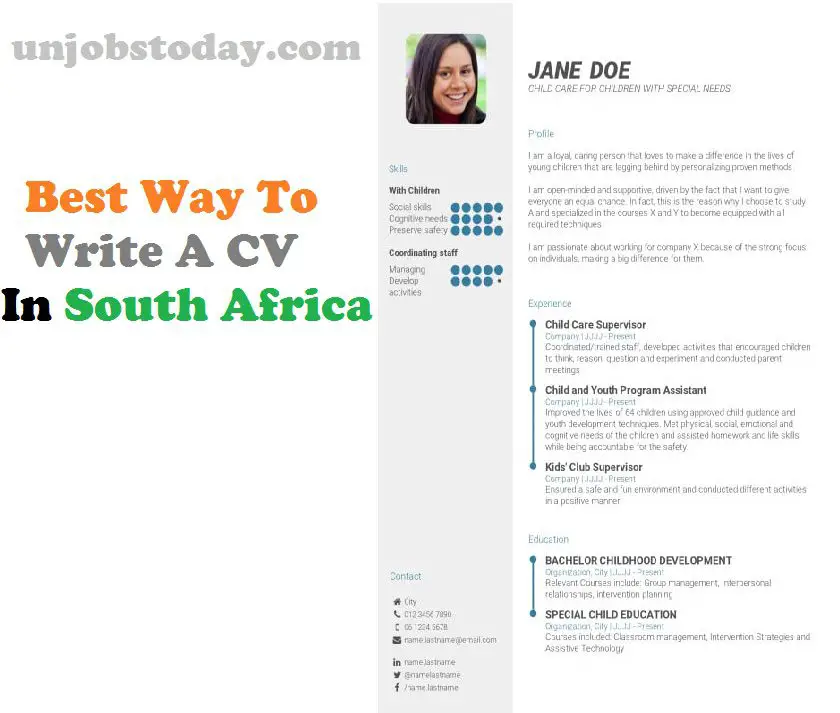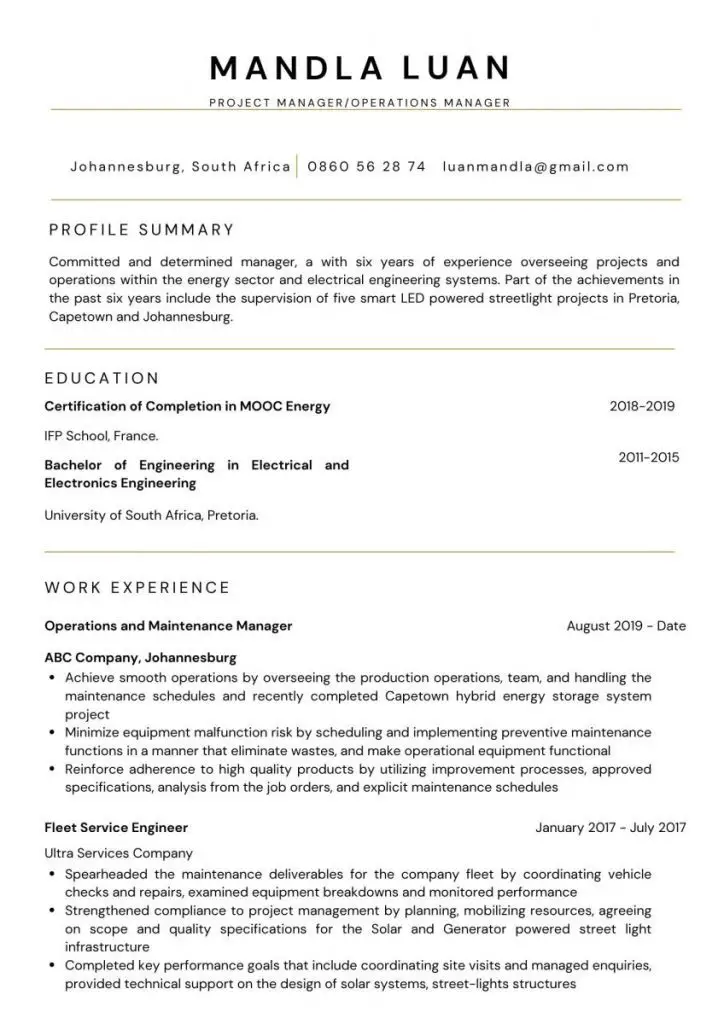Visits: 1
Best Way To Write A CV In South Africa

Your dream job is probably just one strong resume away! Funny? Nope. Voici the concept. Even if you are the most qualified candidate for a position, if the recruiter is not impressed by your CV, you won’t have the opportunity to convince him that you belong on his team.
It takes more than simply listing your qualifications to create a strong CV. And certainly, it extends beyond any potential cosmetic benefits. Therefore, the key is to have a strong CV for the appropriate application. How can you do that, though? How can you create the ideal CV for the position you’ve been dreaming of applying for?
If you’d want to find out how to write a good CV for your next application, then you are definitely at the right place. Read through this article and learn how to write a good CV that stands out.
What is A CV?

How Does a CV Differ From a Resume?
Read this report on this sub topic.
Just before we continue, it’s crucial to realize that many people frequently struggle with this issue. Frequently, candidates are unable to distinguish between a CV and a resume. We’ll take care of that right away, though.
A CV is a written record of your professional and personal details that can be used by a recruiter to choose whether to contact you for an interview or not. In order to be thorough, a decent CV template should include your name, contact information, educational history, professional experience, and personal interests. A resume, however, isn’t like this. A resume is a succinct overview of an individual’s relevant work history in a certain job function. Typically, it is succinct and to the point. A resume isn’t supposed to be longer than 1-2 pages, however a CV allows for as much material to be included as feasible, leading to numerous pages. Additionally, CVs are more common in African nations while resumes are more common in the United States and the United Kingdom.
What Should be Included in my CV?
There are certain things the recruiter always looks out for in a CV, and these are the components that make a good CV. Here is a list of the important details you should include in your CV to get you on that interview seat: For 5 Key Things You Should Always Include In Your CV, Click here.
For Curriculum Vitae (CV) Samples And Writing Tips Check here
Contact Details
To begin with, your CV should have your contact details. This is basically the way the recruiter gets to have a quick grasp on who you are. So, in your contact details, be sure to include your:
- Name
- Professional Title
- Home Address
- Mobile phone number
- Email Address
- LinkedIn Profile
CV Objective
This section of the CV, which is also known as a CV Summary, highlights your professional ambitions and goals. You will be sure to draw attention to the qualities that set you apart from the other applicants when you write this. You are aware that the recruiter has a maximum of 6 seconds to decide whether or not to interview you. Good! This means that you must write a strong CV Objective to impress your potential employer. To ensure that he understands what you’re trying to communicate without having to read it more than once, it must be written in plain and basic English.
Work Experience
Here, you should list the qualifications that make you a good fit for the position. Include the name of the company, your job title, and the duties associated with that position in your work experience. There are some considerations you must make in order to provide the finest service while mentioning your work expertise. First, list your employment history in reverse chronological order, starting with your most recent position. Additionally, while listing your duties, include both the tasks you completed and the results you attained while doing your past employment. Last but not least, just discuss professional experiences related to the position you’re looking for. You might not have to mention your teaching experience, for instance.
Education
Here, you give the interviewer a peek into your education. To write a good CV in this section, keep these tips in mind.
- Include your educational background first if you don’t have any work experience.
- Only include your CGPA if it is worth noting, probably a CGPA of 4.0-5.0.
- If you don’t have a University degree, be sure to include other training relevant to your field that would give you a chance before the interviewer.
Skills and Competencies
Here, you talk about the hard and soft skills you have that make you fit for the job. When applying for an early-child teaching role, your hard skills can include; Ability to use a smart board, understanding of phonic sounds, etc., while your soft skills can include empathy, time management, etc. It is necessary that the skills you include here are the ones you possess and can defend when the time comes.
Certifications and Awards
This is the part you include extra certifications you may have gotten from training or relevant courses to your field. However, this segment of your CV is optional, as it can only be added if you do have any certifications or awards relevant to your field.
Developing a Good CV Format
So, to have a good CV format, there are tips you should keep in mind. Some of them are:
- Always use your name as the title of the document. Don’t make the mistake of titling it “Curriculum Vitae” or even “CV.” That is a very obsolete way to write your CV.
- List everything on your CV in reverse chronological order. That way, you start from the most recent to the least recent event of any segment, especially for your education and work experience.
- Use section headings to break up your CV. Also, every heading should be a bit larger than the content of the heading, just as you can see in this article.
- Always name your document before saving it. Don’t just have your CV as “Document -1.” Nah, that’s not nice. Instead, save the document with your name, for example, “Amahle Siyabonga CV.”
- Always submit your CV in a PDF format, except the application states otherwise. Also, make sure your CV is readable on every device.
How to Write a Good CV
- Tailor your CV to suit a particular job role. Don’t make the mistake of using the same CV for every job opening. That will be very wrong. Also, it is wise to look up the company you’re submitting your CV and ensure your CV will impress the recruiter at first glance.
- Avoid grammatical errors on your CV. Having grammatical errors on your CV is already a way of you shooting yourself in the leg. Ensure you do not have grammatical errors while typing and submitting your CV.
- Stay away from generic and overused words/phrases such as; ability to work under pressure, hard-working, team player or the like of it. Rather than that, bring in scenarios that show you exhibiting these qualities in your previous work experiences.
- If you want to include hobbies and personal interests, include hobbies that are relevant to the field you’re applying for. Also, hobbies like singing, reading, dancing and the like of it have become widely used and may not have a place in your CV.
- Don’t lie or exaggerate on your CV. Your potential employer will see you as dishonest, ruining your chances of getting the job.
- Make sure your email address sounds professional. In most cases, it is just better to use your name for your email address than any form of playful words on your email address. Imagine a recruiter getting an email from “[email protected].”
Read Also: What Is A Poorly Prepared CV
How Long Should a CV be?
One of the beautiful things about a CV is that, unlike a resume, there’s room for it to be long, as long as the information contained in it is relevant to the prospective employer and the field you’re applying for. However, to keep it simple and put you on the safe side, your CV should be at most two pages so the recruiter feels comfortable with having to go through your CV.
Get the Recruiter’s Attention at First Glance with Your CV
The trick to get your recruiter’s attention at first glance with your CV lies with your Summary. The more compelling your Summary is, the higher the chances your CV will grasp the recruiter’s attention. Also, the Summary must pass the 6 seconds test. The recruiter must be able to understand what your objectives are and if you will be a good fit in those 6 seconds. Your Summary has to be like an elevator pitch to convince your recruiter as soon as he looks at it. It should answer the following questions.
- What can you do for the organization? How can you help?
- How will your previous experience help fit in the company’s current environment?
- Do you have personal goals, and how can they fit in as you also help them grow?
Read Also: How To Write A Scholarship Recommendation Letter, and Motivation Letter For Scholarship
Get Help Writing Your CV
If you’ve read through but still need help writing your CV, you can use our CV service or our CV builder to create your CV at no cost.


%20(1).png)

